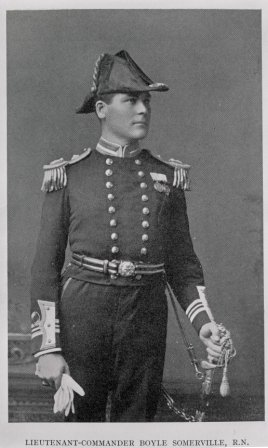Difference between revisions of "Boyle T. Somerville"
WikiadminBot (talk | contribs) (Bot: Automated import of articles) |
(→RAI Material) |
||
| (One intermediate revision by the same user not shown) | |||
| Line 33: | Line 33: | ||
== Related Material Details == | == Related Material Details == | ||
=== RAI Material === | === RAI Material === | ||
| − | manuscripts, photos | + | manuscripts, |
| + | |||
| + | [https://www.therai.org.uk/archives-and-manuscripts/manuscript-contents/0267-somerville-henry-boyle-townshend-cmg-vice-admiral-ms-267/ archives and manuscripts] | ||
| + | |||
| + | photos | ||
| + | |||
| + | [http://barry-laptop/wordpress/index.php/photo/somerville/ RAI History] | ||
| + | |||
=== Other Material === | === Other Material === | ||
PRM field collector | PRM field collector | ||
Latest revision as of 07:24, 12 September 2017
Contents
Notes
Office Notes
House Notes
Commander
Notes From Elsewhere
Vice-Admiral Henry Boyle Townshend Somerville CMG (7 September 1863 – 24 March 1936) was a British navy officer who was murdered by the IRA.
Somerville joined the Royal Navy as a cadet in 1877. He trained as a Hydrographic Surveyor, was promoted to Commander on 31 December 1901,[1] Captain in 1912 and Vice Admiral on 1 August 1919. He retired on 2 August 1919. While on surveying duties in the Western Pacific, Somerville built a significant collection of ethnographic artifacts in Solomon Islands - now in Pitt Rivers Museum, Oxford.
In 1908, while surveying in British waters, he read a book suggesting stone circles and standing stones might have astronomical significance. He thereafter devoted much of his time to surveying such monuments in Britain, Ireland and elsewhere, and became a recognised expert in the field of archaeoastronomy. He contributed papers to the Antiquarian magazine.
As part of the late summer 1917 reorganisation of the burgeoning British Secret Intelligence Service, led by Mansfield Smith-Cumming and his de facto deputy, Colonel Freddie Browning, Somerville was appointed as 'officer in charge of the Naval Section within the Secret Service Bureau.' This was the first career naval officer posting to the Secret Service. In February 1919, Somerville wrote a review setting out a number of basic principles for service and encouraging the development of specialist intelligence technical skills within the navy for intelligence gathering and analysis. Also in February 1919, he was appointed a Companion of the Order of St Michael and St George "in recognition of valuable services during the war".[2]
After his retirement he returned to the family home at Castletownshend, near Cork in Ireland. On 24 March 1936 he was murdered when four men burst into house and fired a revolver. IRA chief of staff Tom Barry was involved in the shooting.[3][4] The Vice-Admiral was targeted for recruiting local men to join the Royal Navy.[5]
He was the younger brother of the novelist and artist, Edith Somerville, who finished his biography of William Mariner for its posthumous publication.
Born Castletownshend, Co. Cork, Ireland; murdered Castletownshend. Lieutenant 1900; later Vice-Admiral. Retired 1919. Very active naval career. Published on anthropology and archaeology. Member of Percy Sladen Reseach Expedition 1904-7.
Publications
External Publications
Ocean Passages for the World. Published for Hydrographic Dept., Admiralty, by HMSO (1923)
The Chart-Makers. Blackwell & Sons. (1928) Commodore Anson's Voyage into the South Seas and Around the World. Heinemann. (1934)
Will Mariner. Faber & Faber. (1936)
Records of the Somerville Family of Castlehaven & Drishane from 1174 to 1940 (with Edith Anna Somerville). Published by Guy & Co, Cork, 1940
House Publications
Related Material Details
RAI Material
manuscripts,
photos
Other Material
PRM field collector
